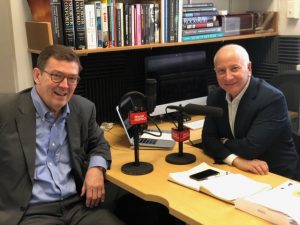Let’s start with the good news. In 2016, the music industry saw two consecutive quarters of growth for the first time in over a decade. This growth, largely due to an increase in streaming subscription revenue, sparked the interest of financial institutions like Goldman Sachs and Credit Suisse that see a very promising future for the industry.
As for the bad news; in the next 4 years the American music industry could face unpredictability on all fronts of the business like never before. Unpredictability is a concept that we in the music industry are all too familiar with. But as we leave 2016 behind and enter the first year of a Donald Trump presidency, we find ourselves in a time of unusual uncertainty and apprehension, not unlike the rest of the U.S.
Uncertainty is not good for business and as a result, investment, that is already hard to acquire in the music industry, will become scarce. As consumers begin to grow unsure of the future, spending on entertainment like music will likely see a hit as well, affecting the streaming subscription revenue that brought growth this year.
Trump’s unpredictability and his lack of comment on music industry issues like copyright reform make it hard to tell whether or not he will make any changes to current copyright laws to help songwriters and artists. This is one of the reasons that, like much of the nation, a large part of the music industry that had been banking on Hillary Clinton’s victory and even funding her
campaign, was shaken by the results of the election.
The musicians and business executives in the industry that pride themselves on diversity and freedom of speech were also dismayed at the victory of Trump’s racist and sexist rhetoric.
With so many musicians speaking out against Trump, the one silver lining we might witness is the return of protest music. In this respect, the live music industry may see a rise in revenues as those who are opposed to Trump’s views come together at concerts. The harsh reality, however, is that the rise of protest music against Trump might also affect his decisions on policy. Trump, who has a track record of being easily offended and vengeful, already spoke out against “unfair” protests that
took place after the election. Protest music, although it is so important at this time, may offend Trump and reflect in his policy decisions, especially for copyright reform.
At the same time, it is also true that Trump has a vested interest in copyright due to his involvement in the entertainment industry. Although much of his campaign was focused against lobbying and against the influence of special interest groups on policy, it is clear from his actions since the election that he is going to do a lot of things to help himself and his businesses. Trump owns about 30 copyrights that come from various projects he has been a part of or owned, including the television show The Apprentice, and this gives him an incentive to push for copyright reform to help copyright owners like himself.
At this time, all we can do is speculate. The only thing that has been consistent throughout Trump’s campaign has been inconsistency and there is no reason to expect any different from his presidency. There is no doubt that Trump’s policies and the members he appoints to his cabinet will have an effect on the economy of the country and the workings of all industries, including the music industry.
Still, great music comes out of difficult times. From the jazz music that surged out of Nazi Germany to the soul singing of Sam Cooke’s A Change Is Gonna Come out of the Civil Rights Movement, history has shown that difficult times bring inspiration for great music; the kind of music that brings people together, helps them fight and provides anthems for their fight. The hope is that the music industry will come out of the next four years as a stronger knit community, providing hope and comfort to those who are afraid for the future of this nation.
Bibliography
Brooks, Dave. “Five Ways the Trump Candidacy Will Impact The Music Industry.” Amplify. Amplify Media Inc., 09 May 2016. Web. 24 Dec. 2016.
Erickson, Kevin. “What A Donald Trump Presidency Means For All Musicians And The Music Business.” Hypebot. Hypebot, 14 Nov. 2016. Web. 24 Dec. 2016.
Grossman, Marla, and Gene Quinn. “Trump on Copyright: How the Trump Administration Will Approach Copyright Law and Potential Copyright Reforms.” IPWatchdog.com. IPWatchdog Inc., 17 Dec. 2016. Web. 24 Dec. 2016.
Rau, Nate. “How President Trump Could Be a Boon for the Music Industry.” The Tennessean. The Tennessean, 11 Nov. 2016. Web. 24 Dec. 2016.
Versace, Chris. “Will Donald Trump Make the Music Industry Great Again?” Newsmax. Newsmax Media Inc., 29 Nov. 2016. Web. 24 Dec. 2016.



 Stock investors looks to equity analysts for guidance on whether to buy, sell or hold stocks in individual companies. Gabelli senior media research analyst John Tinker has covered music and entertainment stocks for over twenty years. In this wide ranging conversation we hunt for value in the stocks of Spotify, Sirius/Pandora, iHeart Media, Live Nation, Tencent Music, Liberty Media and discuss the potential sale by Vivendi of a stake in Universal Music Group.
Stock investors looks to equity analysts for guidance on whether to buy, sell or hold stocks in individual companies. Gabelli senior media research analyst John Tinker has covered music and entertainment stocks for over twenty years. In this wide ranging conversation we hunt for value in the stocks of Spotify, Sirius/Pandora, iHeart Media, Live Nation, Tencent Music, Liberty Media and discuss the potential sale by Vivendi of a stake in Universal Music Group. The Music Modernization Act, now set to become law, is silent on one big remaining issue for the music industry: U.S. AM/FM radio stations pay nothing to broadcast the sound recordings they play.
The Music Modernization Act, now set to become law, is silent on one big remaining issue for the music industry: U.S. AM/FM radio stations pay nothing to broadcast the sound recordings they play.